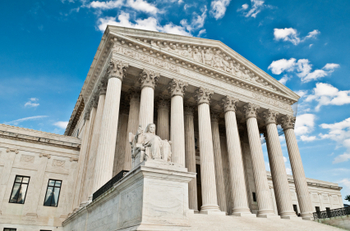
Justice Kennedy again appears to be the decisive swing voter.
This week’s oral arguments before the Supreme Court shed some new light on how the justices are likely to vote on the constitutionality of the individual health insurance mandate contained in the Affordable Care Act (ACA). Overall, the arguments went well for the anti-mandate plaintiffs. But the ultimate result is still difficult to predict. Four justices seem likely to vote to strike down the mandate, while four others are likely to vote to uphold it. As the Court’s key swing voter, Justice Anthony Kennedy could potentially go either way.
The conservative justices zeroed in on the biggest hole in the pro-mandate argument: the likelihood that the federal government’s various rationales for the health insurance mandate would also authorize virtually any other mandate. This extension of congressional authority would undermine the basic constitutional principle that federal power is limited. As Justice Antonin Scalia put it, the key question is this: “What is left? If the government can do this, what else can it not do?”
On the other hand, the four liberal justices—Stephen Breyer, Ruth Bader Ginsburg, Elena Kagan, and Sonia Sotomayor—were all expected to uphold the mandate. And they all seemed to support the mandate at the oral arguments.
Justice Breyer has been a major intellectual leader of the liberal wing’s resistance to any significant judicial enforcement of structural limits on Congress’ enumerated powers. He wrote well-known dissents in several previous cases striking down congressional laws on federalism grounds, including United States v. Lopez, a key 1995 decision in which the Court invalidated a federal law banning possession of guns in school zones as going beyond Congress’ power to regulate interstate commerce. During the oral arguments, Breyer at one point suggested that the fact that “members of Congress are elected from States” may itself be a sufficient limit on its powers. This statement reflects the view of many left-of-center scholars and jurists that there is no need for judicial enforcement of federalism-based limits on congressional authority; they believe that any abuses of power in this sphere can be dealt with by the democratic process.
Justice Ginsburg has voted the same way as Breyer in every major federalism case over the 18 years they have served together on the Court. Unsurprisingly, she too expressed support for the government’s position during the oral arguments.
Justices Sotomayor and Kagan have less extensive track records on constitutional federalism issues than Justices Breyer and Ginsburg, in large part because they have only been on the Court for a short time. On the other hand, both are appointees of President Obama. It is highly unlikely that he would have appointed anyone who might vote to strike down his administration’s best-known legislative achievement or who would dissent significantly from the general consensus on federalism issues among liberal jurists. While serving as the Obama Administration’s Solicitor General, Justice Kagan expressed satisfaction at the enactment of the ACA, and participated in a minor way in the Administration’s early efforts to plan a legal strategy to defend the Act against legal challenge (though the Justice Department did apparently wall her off from any in-depth involvement in the case).
Among the conservative members of the Court, Justice Clarence Thomas has been the strongest advocate of judicial enforcement of limits on congressional power. In two well-known opinions, he has argued for the reconsideration of longstanding precedents that interpret Congress’ power to regulate interstate commerce as allowing regulation of virtually any “economic activity” that “substantially affects” commerce. As is his usual practice, Justice Thomas was silent at the oral arguments. Still, he is a near-certain vote to strike down the mandate.
Some commentators suggested before the oral arguments that Justice Scalia might vote to uphold the mandate because he endorsed a broad interpretation of Congress’ powers under the Necessary and Proper Clause in his concurring opinion in a 2005 case, Gonzales v. Raich. That clause gives Congress the authority to pass laws that are “necessary and proper” for “carrying into Execution” its other powers under the Constitution. At the oral arguments, however, Scalia confounded such expectations. He emphasized that a law must be both “Necessary and Proper” to pass muster under the Clause, and that the individual mandate was not “proper” if it could only be justified by a rationale that would give Congress unlimited power to impose other mandates. As he put it, the mandate is “not proper, because it violates [the] principle…that the Federal Government is…supposed to be a government of limited powers.” In Raich, the definition of “proper” was not considered.
Justice Samuel Alito also worried that the government’s rationale for the mandate would give unlimited power to Congress. He too is likely to vote against it. As a lower court judge, Justice Alito showed a strong commitment to a limited view of federal power. He was one of the few lower court judges to rule that the Commerce Clause does not authorize a federal law banning possession of machine guns.
Chief Justice John Roberts’s record on federalism issues is less clear than Justice Alito’s. Before the oral arguments, many observers thought he was a possible vote for the mandate—myself included. However, his questions at the arguments expressed grave concerns about the law. Like Justice Scalia, he worried that upholding it would lead to unconstrained federal power. It now seems unlikely that he will vote to uphold the mandate, though some experts believe it possible that he will do so if at least one other conservative justice does the same, thereby enabling him to control the assignment of the majority opinion—a prerogative enjoyed by the Chief Justice any time he is in the majority.
As on many other issues over the last decade, Justice Kennedy is likely to be the decisive swing voter in the case. At the oral arguments, he too worried that upholding the mandate would lead to unconstrained federal power. He also suggested that the law “changes the relationship of the federal government to the individual in a very fundamental way.” Later, however, he implied that he might be sympathetic to one of the federal government’s many arguments claiming that the mandate is a special case, fundamentally different from other possible mandates. He noted that the uninsured have a significant effect on health care markets that might be greater than the economic impact of failure to purchase other products.
In an important opinion for the Court that he wrote last year, Justice Kennedy emphasized that constitutional limits on federal power protect “the freedom of the individual” as well as states’ rights. He is unlikely to vote to uphold the mandate unless he is convinced that federalism’s protection for individual liberty will not be gutted as a result. The outcome of this important case may well come down to whether Justice Kennedy concludes that the mandate is compatible with the idea of limited federal power.




